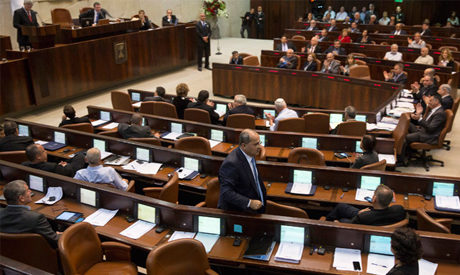
File Photo: Knesset (Photo: Reuters)
WHAT'S AT STAKE?
Voters will elect a 120-member parliament, or Knesset, Israel's 20th. Citizens vote for party lists, not individual candidates. Seats are allocated in the Knesset according to the percentage of the national vote the parties win.
___
WHO IS RUNNING?
There are 25 parties running. Key parties are the governing Likud Party, led by Prime Minister Benjamin Netanyahu, who takes a hard line against the Palestinians and Iran; The Zionist Union, a joint list headed by Isaac Herzog and Tzipi Livni, which wants to resume negotiations with the Palestinians, repair ties with the White House and has emphasized economic issues; The Joint List, a union of Arab parties that is expected to drive up chronically low voter turnout among Israel's Arab minority; Kulanu, led by Likud defector Moshe Kahlon, who has focused on the economy and set his sights on the Finance Ministry; Jewish Home, led by high-tech millionaire Naftali Bennett, Netanyahu's chief rival for the support of West Bank settlers; Yesh Atid, led by former TV personality Yair Lapid, who is also promising relief for the struggling middle class. Two ultra-Orthodox Jewish parties could play key roles after the election. According to a 2014 law, a party must win 3.25 percent of the vote to be represented in parliament.
___
HOW IS A GOVERNMENT FORMED?
In Israel's 67-year history, no party has ever won an outright majority of 61 seats, and the country has always been governed by a coalition. After the vote, Israel's president meets with party leaders to determine who has the best chance of forming a government. The president then taps the head of that party, usually but not necessarily parliament's largest, to undertake that task. That person will have up to six weeks to form a coalition. If successful, he or she becomes prime minister; if not, the president chooses another party to try. The president could also ask the leaders of the two biggest parties to form a unity government.
___
WHAT ARE THE ELECTION-DAY LOGISTICS?
There are 5,881,696 eligible voters. Most of the 10,119 polling stations across the country open at 7 a.m. (05:00 GMT; 1 a.m. EST) and close at 10 p.m. (20:00 GMT; 4 p.m. EST). Exit polls will be released immediately after voting ends, and official results will trickle in throughout the night. Voter turnout in the last election in 2013 was 67.8 percent. Election Day is a national holiday, and most workers have the day off.
___
WHAT ARE ISRAEL'S DEMOGRAPHICS?
Population: 8.2 million, of whom 75 percent (6.2 million) are Jews, 20 percent (1.7 million) are Palestinian Arabs and the rest are classified as "others," most of them non-Jewish immigrants. Per capita GDP is $36,051.
*This story was edited by Ahram Online
Short link: